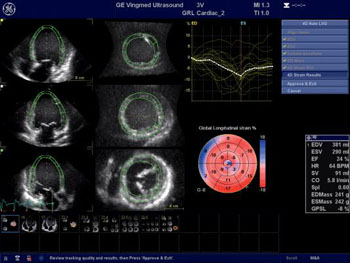Strain Echocardiography Predicts Hypertrophic Cardiomyopathy Risk
By MedImaging International staff writers
Posted on 30 Jun 2016
A new study shows that strain echocardiography can accurately predict which patients are likely to have complications resulting from hypertrophic cardiomyopathy (HCM).Posted on 30 Jun 2016
Researchers at Johns Hopkins University (JHU, Baltimore, MD, USA) conducted a study in 400 HCM patients who were followed for 37 months, and who underwent both conventional and strain echocardiography to obtain global longitudinal strain (GLS) data, an objective and reproducible imaging modality than can be used to quantify subtle disturbances in left ventricular (LV) function by detecting sub-endocardial contractility and viability, which often precede an overt impairment of LV function, as measured by ejection fraction (EF).

Image: Researchers found using strain echocardiography could accurately predict which patients were likely to have complications from hypertrophic cardiomyopathy (Photo courtesy of GE / JHU).
The results showed that GLS measured by strain echocardiography can be used as a cardiovascular diagnostic technique that is a sensitive and powerful way to assess patient HCM outcomes, which are a common, but often undetected, leading cause of sudden cardiac death (SCD) in young adults. The study was presented as a poster session at the American Society of Echocardiography (ASE) 27th annual scientific sessions, held during June 2016 in Seattle (WA, USA).
“HCM is the most common inherited cardiac condition, with several disabling and life-threatening complications. Global longitudinal strain was able to independently predict key outcomes in HCM, and therefore has the potential to become an essential tool in HCM risk assessment,” said lead author and study presenter Hongyun Liu, MD, of the JHU HCM Center of Excellence.
HCM is a primary disease of the myocardium in which a portion of it becomes hypertrophic without any obvious cause, creating functional impairment of the cardiac muscle. It is a leading cause of SCD in young athletes, and indeed in any age group, and a cause of disabling cardiac symptoms. HCM is frequently asymptomatic until SCD, and for this reason some suggest routinely screening certain populations for this disease, as the prevalence is about 0.2% to 0.5% of the general population.
Related Links:
Johns Hopkins University














